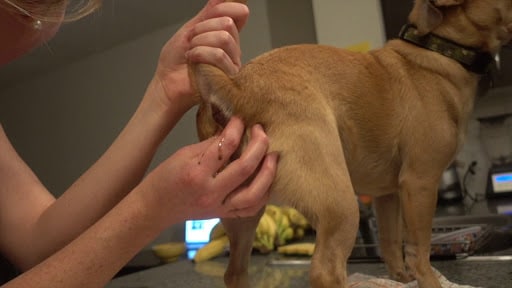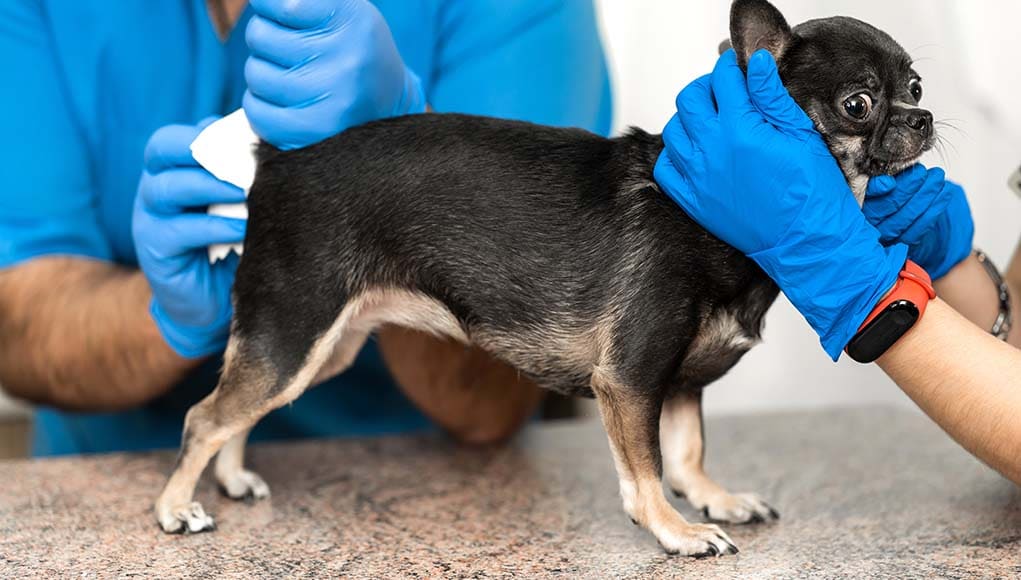The issue of anal glands in pets is almost always in the shadows until there’s a problem.
When your dog shows signs and symptoms of trouble in the rear, you are forced to seek help and get a solution to the problem.
The treatment is mainly the expression or sucking of the material from the glands. Once the material is out, your dog will feel so much better.
Expression is a rather straightforward procedure that takes a relatively short period of time.
The issue comes when you are back at home with your pet but the smell just won’t go away. This can be quite worrying and unsettling for most dog owners.
Why does your dog still smell after glands expressed? We will find out shortly but before then…
What Are Anal Glands?
A good understanding of anal glands is necessary before we delve deep into the topic.
In simple terms, these are tiny glands located on a dog’s rectal opening. They are designed to release a lubricant that helps stool pass along the rectum with ease.
Each gland contains a brown substance with a unique unpleasant smell.
When the dog defecates or urinates, the glands are gently pressed to release the liquid along with the stool.
The liquid also gives the canine her unique scent. When she meets a fellow canine, tails are raised – an action that presses on the glands to release its stuff.
The other dog then sniffs it as a sign of greeting. The scent, in a way, helps them identify each other.
Why Are Glands Expressed?

Most dogs have zero issues with their anal glands. However, bacteria buildup can bring problems with the natural expression of the glands.
When bacterial overgrows in the glands, swelling and the formation of pus will soon follow suit.
If left untreated, the gland will cause pain and in the worst-case scenario, rapture the skin.
Besides infections, an impaction can occur when the fluid hasn’t been emptied all the way.
When the sac still has some fluid, it can become dry over time causing real pain to the dog. Soft stools, obesity, and abnormalities in the anal glands cause impactions.
Although rare, anal tumors can also limit the pooch’s ability to naturally express his lands. This is serious especially if the tumor is cancerous as it can spread to other parts of the body.
When you see your pooch holding her tail down in an unusual manner, being reluctant to walking, or pulling his rear side against the floor, her anal glands could very well be uncomfortable or painful.
Other signs include strain during defecation, the release of a stinky material even when not passing stool, biting of the tail, and the appearance of a red bulge near the anal glands.
Expression is done by squeezing the anal glands with steady pressure to cause them to release the secretions located inside of them.
The veterinarian or professional groomer will use latex gloves, lots of paper towels, and a lubricant to carry out the procedure.
The pressure applied should be just enough to push the liquid out without rupturing the glands.
Some pet owners express the glands without needing professional help. As long as you can handle the strong unpleasant smell and know how to press the glands right, you should be good to go.
You may also want to check: What Dog Breeds Need Their Glands Expressed?
Dog Still Smells after Glands Expressed: What’s happening?
Removal of the gland substance is a real stinky situation. Even before expressing, most homeowners identify the problem because of the smell that comes out of their pets.
Most will bathe the dog frequently to try and get rid of it. When it doesn’t leave and the smell of poop is all over the place, there’s enough proof that the anal glands need expression.
The substance inside the glands has been said to bear an odor similar to feces or fish. It’s quite strong.
As a result, most homeowners prefer to have a professional express the glands. The task is quite smelly and unpleasant.
Even after expressing, it’s not unusual to have to endure the fishy smell a while longer.
Often, the glands still secrete the fluid indicating a job poorly done. The sac should be emptied sufficiently by a professional.
If you are unlucky enough to come across an inexperienced and unknowledgeable vet, you may run into this problem.
In cases where you carry out the procedure by yourself, the probability of doing a half-baked job is high. This means your dog will still secrete the horrible fluid from time to time causing the smell to linger.
The best course of action, in this case, is to seek genuine professional help.
Secondly, your dog still smells after glands expressed because the fluid has filled up again.
The frequency of expression differs for different dogs. Some only need one treatment in the entire course of their lives to alleviate the problem once and for all.
Others do well with monthly expressions while others need even more regular treatments.
If your pup tends to have a bad smell a day after her last expression, it could mean that her sac fills up with the stinky fluid fast. This is quite a challenge but there are remedies you can use.
Removal of the glands may then be considered but you will have to talk it out with your vet beforehand.
Last but not least, a lingering smell may not be as serious as it seems. After expression, it is less likely for the smell to go away completely.
Vets actually use very strong deodorizing agents to kill the odor quickly. If you don’t have any access to any of the agents, you might have to brave a few hours of the nasty smell.
Bathing the dog after expression almost always solves the problem. Gently clean the backside and hope for the best.
The good news is that even if the stink sticks around, it will soon go away. Within 24 hours or less, you should have a fresh dog and home.
Going forward, monitor your pup’s diet closely. Ensure her diet has plenty of fiber to firm up the stool so it can apply enough pressure on the sacs to release the fluid.
While at it, be careful not to overfeed her. As mentioned earlier, obesity is a big cause of anal gland problems in dogs.
Final Thoughts
Have you been wondering why your dog still smells after glands expressed? Hopefully, you have a better idea of what’s going on.
In simple terms, your fur baby could still be having some fluid left in her sacs, needs another round of expression, or just requires thorough cleaning.
Give it a day or so and monitor the situation. In case of further concerns, bring her to the vet to be checked.
Related Post:
Why Does My Dog’s Vag Smell Like Metal?
What to Use on a Dog’s Sore Bum
As an Amazon Associate, we may receive a small commission from qualifying purchases but at no extra cost to you. Learn more. Amazon and the Amazon logo are trademarks of Amazon.com, Inc, or its affiliates.

